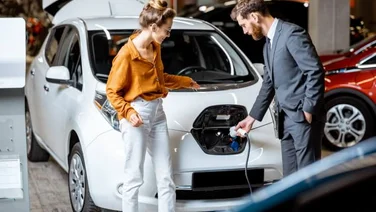We receive a small fee from trusted installers when you request a quote through our site. This helps us keep our content independent, well-researched and up to date – Learn more
- 19% of all car registrations in June 2024 were electric vehicles
- 20% of total car sales could be electric vehicles by the end of 2024
- 100% of cars and vans must be zero emissions by 2035
On 3 January, the Zero Emission Vehicle (ZEV) Mandate officially became law in Great Britain. The law states that 80% of all new cars and 70% of vans sold in Great Britain must be zero emission by 2023, before increasing to 100% by 2035.
Manufacturers have been preparing for this mandate for months. In the first half of 2024, 16.6% of all new car registrations were fully electric cars, with 167,096 new electric cars registered. The June figure was 19%, so it’s plausible that electric cars could account for one in five total car sales by the end of 2024.
As the market continues to transition towards electric vehicles (EVs), it’s useful to know the latest statistics so you can make the right decision when buying a new vehicle. These include how many EVs are in the UK, the price of installing an electric charger, and what it costs to charge a car.
Get free EV charging point quotes
Answer a few quick questions, and our trusted installers will send you bespoke EV charging point quotes – for free.

How many EVs are there in the UK?
As of the end of June 2024, there are more than 1,145,000 fully electric cars on UK roads, according to electric vehicle and charging point platform, Zapmap – and that number continues to rise.
What’s more, nearly 315,000 battery-electric cars were registered in 2023, a growth of 18% on those registered in 2022.
However, this growth is being driven by fleet buyers, with demand for EVs among private buyers in decline.

Diesel car sales were down 12.1% in the first half of 2024 – 66,220 diesel cars were registered, compared to the same time frame in 2023 where 75,321 cars were registered.
Petrol cars experienced a small uplift in the first half of 2024, growing by 2.7% from 539,606 registrations in the first half of 2023 to 554,087 in the same period in 2024. This uplift was mainly driven by the first months of the year, and in June 2024 petrol car sales were down 7.8% on June 2023.
What percentage of vehicles in Britain are electric?
At the end of March 2024, zero emissions (fully electric) vehicles accounted for 2.7% of all road using vehicles, compared to 1.9% at the end of March 2023, according to government data from the DVLA.

Source: The SMMTLooking at all types of electric cars, including hybrids, they made up 38.4% of all new car registrations in the first half of 2024.
BEV (fully electric) were up 9.2% on the same period last year, with a 21.3% increase, while plug-in hybrid vehicles increased by 31.2% and hybrid electric vehicles jumped by 15.2%.
Although the growth has been driven by the fleet market – thanks to tax incentives for EVs – these figures are likely to grow as more consumers understand the benefits of owning an EV for both the environment and their monthly outgoings following the initial outlay.
What’s the most popular electric vehicle?
Tesla Y model remains the most-popular electric vehicle in the UK, with drivers having registered more than 8,000 (8,626) of the Elon Musk creation than any other electric vehicle between July and September 2023. This is in line with the latest UK government figures.
However, it’s worth noting that Tesla figures are in decline, according to the government data. Almost 10,000 (9,598) of the Tesla Model Y were registered between July and September 2022, meaning the model has experienced an 8% decline in just 12 months.
Moving up the ranks and one worth keeping your eye on is the MG 4 model by MG. Registrations jumped from 5,597 between July and September 2022 to 6,235 in the same quarter last year.
On the PHV front, the Ford Kuga is the most popular among consumers with 3,117 cars registered between July and September 2023. According to Carwow, the average RRP range of a Ford Kuga is £32,080 to £42,455.
Do more people own electric vehicles now?
The market as whole is gradually shifting towards EVs, with fully electric cars (BEVs) the most popular choice, but that’s being driven by fleet buyers because of favourable tax incentives.
Fewer than one in six new BEVs bought in April 2024 went to consumers, whose uptake volumes fell by -21.9%.
Overall, EV ownership has still shot up over the past two decades.
From 2000 to 2009, the number of electric vehicles rose from a mere 400 to 62,800 – a 15,700% increase.
In the 2010s, this figure jumped from 83,900 to 758,200, a 904% increase. Every year since 2010, the annual increase in electric models has gone up.
This is backed by Eco-Experts’ latest 2023 National Home Survey, which found that 54% would buy an electric car if money was no object. However, 56% of consumers view EVs as too expensive, according to Auto Trader.
Are electric cars cheaper than petrol cars to own?
The average cost of running a 100% electric car is 8p per mile, according to UK government data.
When comparing these rates to petrol and diesel, EV drivers stand to save anywhere from 5p to 18p per mile. The savings depends on the vehicle’s engine size for diesel and petrol cars, and the type of fuel.
For example, if you’re currently driving a petrol car that’s over 2,000cc, it costs 26p on average to run. Similarly, diesel engines over 2,000cc will cost drivers 20p per mile.
How much will you save over an EV’s lifetime?
On average, a car has an average lifespan of 10-14 years and will clock up around 200,000 miles. An electric car, according to The Electric Car Scheme, is expected to last between 100,000 to 200,000 miles. So your new EV could last as long as a standard car, but a lot will depend on the make and model. Plus, with EV technology improving all the time, we’re yet to get a full picture of whether they can outlast petrol or diesel cars.

The cost to charge an electric car battery will depend on its size and where you’re charging it. However, all in all, Octopus EV claims you’ll be spending less than between 7.5p to 9.1p per mile and have an annual refuelling costs that are 58% less than for petrol cars. That aligns with the government figures set out above for the an 8p cost per mile of an EV.
Public charging points can be more costly, so you’ll need a home charger to get the cost per mile as low as possible. Fill in this form to see how much one would cost you.
How far can you drive an EV without charging?
The average range of an EV is estimated to be 211 miles and most cars on the market have a range between 100 and 300 miles.
It’s worth noting that anything with 200+ miles is considered a good range, but depending on your needs, a range of around 100 miles might be more than enough.
For reference, 100 miles would be driving from Brighton to Bournemouth – a lot longer than the average commute. The average driver travels 18 miles a day, meaning EV drivers could go up to 11 days between charges.
An EV’s range can be negatively impacted by many factors, including:
- Cold temperatures
- Driving at speeds over 65 miles per hour
- Headwinds
- How heavy its cargo is (e.g. passengers and any luggage)
- Under-inflated tyres
- The heating or air conditioning being on
- The battery ageing
How many public charging points are there in the UK?
At the end of June 2024, there were 64,775 public electric vehicle charging points across the UK, across 33,829 charging locations, according to ZapMap.
Among these, 12,551 are rapid or ultra-rapid chargers, defined as 50kW and above. This enables EV drivers to add up to 100 miles of range in 35 minutes. The number of rapid and ultra-rapid devices has increased by almost 46% since June 2023.Has the number of public chargers grown over time?
There has been a 46% increase in the number of public chargers in the past year, with 20,367 installed since June 2023.
This builds on previous rapid growth, increasing from 37,263 public points in 2022 to 53,865 in 2023 – a boost of 45%.
What’s more, this current figure of 33,829 charging locatons is more than four times the number of petrol stations, of which there are now 8,381, according to Statista and the Association for Petroleum and Explosives Administration.
The previous Conservative government set a target of 300,000 public charge points by 2030. It’s not yet known whether the Labour government target will differ.
How many EVs are there per public charger?
Ideally, you want there to always be an available public charger when you pull up to a refuelling station. Increasing numbers of public chargers mean you’ll have to share with fewer drivers, despite the huge rise in electric vehicle ownership.
With 64,775 public charging points in the UK at the end of June, and around 1,145,000 electric cars and 60,000 electric vans on the road, this works out at under 19 vehicles per public charger. This compares with 53 per charger in 2022 and 75 vehicles per public charger in 2015.
This shows the likelihood of finding a free charger when you need it has increased dramatically in recent years – and looking at the latest figures, there’s every reason to think this trend will continue.
Are EVs fighting climate change?
In 2022, EV drivers in the UK stopped the climate from being exposed to 8.4 million tonnes of CO2e*, according to our calculations.
That’s how much CO2e would have been released if the country’s 2,313,900 electric vehicles were powered by fossil fuels instead.
But as long as electric drivers signed up to one of the many 100% renewable energy plans currently available, their vehicles wouldn’t contribute to carbon emissions, giving them an emissions total of zero.
That means that unlike drivers who use fossil fuels, each electric driver will save 54.14 tonnes of CO2e over their vehicle’s typical 150,000-mile lifetime.
If every vehicle currently registered in the UK – all 41.4 million of them – was electric, we could save around 2.2 billion tonnes of CO2e over the course of those vehicles’ lifetimes.
*carbon dioxide equivalent, a measurement that converts all greenhouse emissions into CO2 terms
Driving carbon emissions
The average driver in the UK drives approximately 7,400 miles annually, according to Britannia Car Leasing. This would mean the average driver emits up to 3.7 tonnes of CO2 every year.
However, if you invest in an EV and use a 100% green tariff, it’s possible to completely eliminate this from your footprint.
Road traffic in the UK released around 99.7 million tonnes of CO2e over the past year, which could be eradicated entirely.
All it would take is everyone driving an EV that’s charged with green energy – which is feasible. Even electric HGVs are starting to become a realistic option.
While it’s strange to think it’s feasible in a cost-of-living crisis, EV drivers can sign up to 100% renewable plans with everyone from Octopus Energy to the big six energy suppliers, like E.ON, often at little or no additional cost compared with a standard tariff.
Other EVs
Cars are not the only electric transport option.
Electric van sales actually fell in the first half of 2024, with a drop in sales from 8,803 in the same period of 2023 to 8,353 in 2024. Market share was down from 5.2% to 5.7%. Diesel van sales increased slightly (by 4.6%). The range of electric vans available has been increasing in the past year, so the fall in sales has surprised analysts.
When it comes to e-scooters and e-bikes, the picture is mixed. There are a growing number of e-scooter rental schemes, but legal restrictions on private scooters, and sales of e-bikes have fallen back.
Electric scooters
Currently, it’s illegal to ride privately-owned e-scooters on public land. That means that public rental e-scooters are the only e-scooters that you can use for transport, and even those are only permitted in areas which have signed up to a government trial.
It’s not clear whether the law will change. Ireland recently legalised privately owned e-scooters, and many other European countries have already done so.
The global electric scooters market size was estimated at $37 billion (£29 billion) in 2023 and is expected to grow at a compound annual growth rate of 9.9% by 2030, as reported by Grand View Research.
Popularity of e-scooters is heating up in the UK, too. A 2023 report by Swifty Scooters found that 90% of respondents would consider purchasing and riding an e-scooter and 75% would consider an e-scooter to swap short car journeys for a cleaner mode.
Electric bikes
The e-bike market is estimated to reach $501.37 million (£391.28 million) in 2024, which is expected to grow to $832.85 million (£650 million) by 2029, according to Mordor Intelligence.
Although there’s clear growth potential within the e-bike market, volume sales fell by 7% in 2023. However, volumes are still well ahead of 2019 levels. The Bike Association says sales will likely return in 2025.
E-bikes are significantly more expensive than standard cycles, so the decline could be due to the rise in inflation and consumers focusing on their monthly outgoings and budgeting.
“While the first few months of 2024 are expected to be difficult, volumes are forecast to grow in the last to mid-single digits between 2024 to 2026,” the Bike Association reported in its annual market report on electric bikes.
How will the EV market grow in 2025 and beyond?
With the government mandate now in place, it’s clear the EV market will only grow, as drivers will eventually have little choice but to invest in one, or to turn to the secondhand market for a petrol or diesel vehicle.
According to EV charging platform Virta, if all of the policy pledges announced so far around the world are fully met, almost 250 million EVs will be on the roads globally by 2030 and EV sales will represent over 35% of all vehicle sales.
Will new entrants grow their market share?
Projected revenue in the UK EV market is expected to reach $20.6 billion (£20.3 billion) in 2024 and is expected to grow by a further $8.2 billion (£6.4 billion) by 2028.
Looking ahead, new entrants will likely capture market share in the UK, rising from 8% in 2023 to one in six new cars sales by 2030.
The Auto Trader Road to 2035 report says for this to happen, these new entrants need to be more aggressive on price.
“Since their entry into the UK market, they’ve launched models with a ‘brand premium’ compared to the prices available in China,” the report said. “The BYD Dolphin has a starting RRP of £25,000 in the UK, but in China, it starts at just £13k.”
Summary
The EV industry is well-placed to keep gaining on its fossil fuel-powered counterpart.
As discussed, EVs – while more expensive initially – can save drivers thousands over the course of their lifetime. They not only save on charging and fuel costs, but drivers typically experience lower insurance costs too.
You can save money on charging costs by installing a home charger, but public chargers are also growing at a substantial rate. And you’ll be on the road in no time, with some rapid chargers charging an EV in 35 minutes.
Despite recent dips in demand for electric vans and bikes, it’s likely that these will rise in popularity over the coming years, and the number of e-scooters could increase too.
Next steps
If you want to get involved, just fill in this form to find out how much an EV charging point will cost you.









